Revolutionize Learning with Education Chatbots Today!

Education chatbots are transforming the way we learn by leveraging artificial intelligence (AI) and chatbot technology to provide personalized support and enhance student engagement.
These AI-powered education systems serve as virtual assistants in education, offering 24/7 access to support and guidance.
With chatbot applications in education, students can receive quick and accurate answers to their questions, personalized recommendations based on their learning history, and access to a wide range of resources.
Key Takeaways:
- Education chatbots utilize AI and chatbot technology to revolutionize learning.
- They provide personalized support, quick answers, and access to resources.
- Chatbots enhance student engagement and motivation.
- They improve study skills, time management, and learning outcomes.
- Chatbots streamline administrative tasks and offer personalized learning paths.
Education Chatbots and AI-powered Education Systems
AI-powered education systems are reshaping the traditional classroom experience, harnessing the capabilities of intelligent chatbots and conversational AI to deliver personalized education and support. These innovative technologies are revolutionizing learning by providing students with 24/7 access to support and guidance, improving study skills and time management, increasing motivation and engagement, and granting access to a wide range of resources.
Intelligent chatbots, powered by AI act as virtual tutors, offering quick and accurate answers to student queries through natural language processing. They analyze student data to provide personalized recommendations based on each individual’s learning history, offering tailored resources and guidance. Conversational AI enables interactive, engaging, and dynamic learning experiences, making education more accessible and enjoyable.
One of the key applications of AI-powered education systems is the development of intelligent tutoring systems. These systems leverage chatbot technology to create personalized learning paths for students. By analyzing data on student progress, they offer targeted recommendations and resources, guiding learners on their educational journey and fostering independent learning skills.
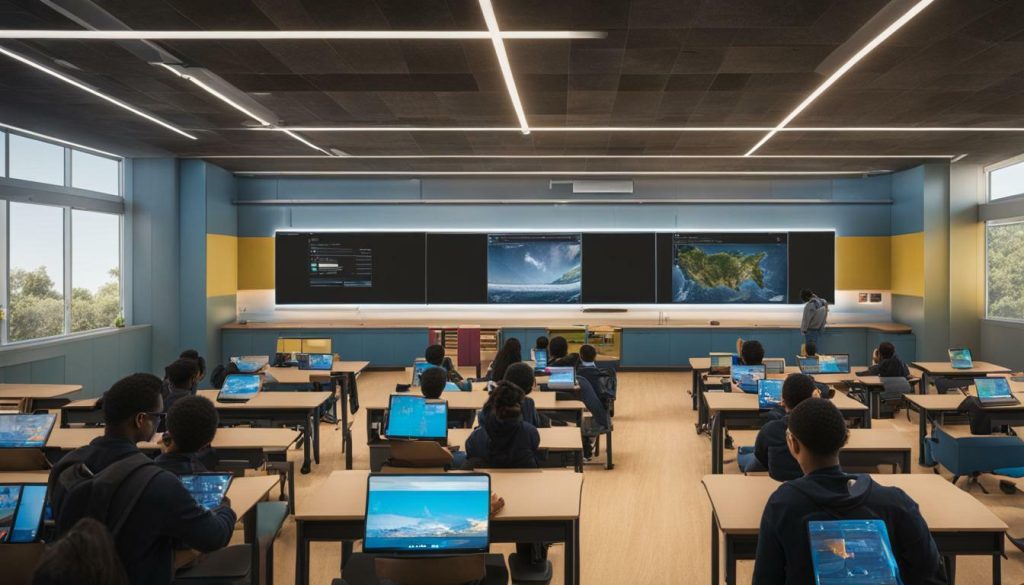
| Benefits of AI-powered education systems: | Applications of chatbot technology in education: |
|---|---|
|
|
As we look to the future, chatbots will continue to play a pivotal role in education. They have the potential to serve as e-learning support, language teachers, and offer personalized support to both students and educators.
Additionally, chatbots can contribute to improving student life on campus by providing access to information, resources, and services in a convenient and efficient manner.
Enhancing Learning with Virtual Assistants for Education
Virtual assistants for education are revolutionizing the way students learn, offering personalized support and guidance throughout their educational journey. These digital assistants provide students with instant access to information, resources, and personalized recommendations, making learning a more interactive and engaging experience.
One of the key advantages of virtual assistants in education is their ability to provide personalized education. By analyzing individual learning patterns and preferences, virtual assistants can tailor their recommendations and resources to suit each student’s unique needs. This level of personalization helps students stay motivated, improve their study skills and time management, and ultimately achieve better learning outcomes.
In addition to personalized education, virtual assistants also support students in their learning journey. They can answer questions in real-time, provide quick and accurate responses, and offer guidance whenever students need it. With virtual assistants, students no longer have to wait for office hours or rely solely on textbooks for information. They have a reliable source of support available 24/7.
Moreover, virtual assistants enable smart learning experiences. They can be integrated with learning management systems, providing students with a seamless learning environment. Virtual assistants can create interactive quizzes, offer gamified learning activities, and track students’ progress, ensuring that learning remains engaging and enjoyable.
Benefits of Virtual Assistants for Education
The benefits of virtual assistants for education are numerous. Here are a few key advantages:
- Personalized support: Virtual assistants offer personalized recommendations based on a student’s learning history, helping them focus on areas that need improvement.
- Improved study skills and time management: Virtual assistants provide guidance on effective study techniques and help students manage their time efficiently.
- Increased motivation and engagement with learning: By offering interactive and gamified learning experiences, virtual assistants keep students motivated and engaged in their studies.
- Access to a wide range of resources: Virtual assistants have access to vast databases of educational materials, ensuring that students have access to a variety of resources to enhance their learning.
With the continuous advancements in technology, virtual assistants for education are only going to become more sophisticated and integral to the learning process. They have the potential to transform education by providing personalized support, enhancing student engagement, and improving learning outcomes.
As we move forward, it is important to embrace the use of virtual assistants in education and unlock the full potential of this innovative technology.

Chatbots have found diverse applications in education, automating administrative tasks, providing access to learning resources, and assisting in student assessments. These AI-powered virtual assistants are transforming the way educational institutions operate and improving the learning experience for students.
One of the key applications of chatbots in education is their ability to automate administrative tasks. Chatbots can handle enrollment processes, answer frequently asked questions, assist in scheduling classes and exams, and provide reminders to students. By automating these tasks, chatbots free up time for educators and administrators to focus on more strategic aspects of education.
Another important role of chatbots in education is providing access to learning resources. Chatbots can deliver course materials, recommend relevant study materials, and even provide personalized learning paths based on a student’s learning history. This ensures that students have access to a wide range of resources and can tailor their learning experience to their individual needs.
The impact of chatbot technology on education automation
“Chatbots are revolutionizing education by offering 24/7 access to support and guidance, personalized recommendations based on a student’s learning history, quick and accurate answers to questions, improved study skills and time management, increased motivation and engagement with learning, and access to a wide range of resources.”
Additionally, chatbots play a crucial role in assisting student assessments. They can provide real-time feedback and grading on assignments and quizzes, helping students track their progress and identify areas for improvement. Chatbots can also analyze student data and provide insights to educators, enabling them to make data-driven decisions and personalize the learning experience.
As the use of chatbots in education continues to evolve, their potential for enhancing the learning experience is vast. They can be integrated with learning management systems to enhance student engagement, provide immediate assistance, offer personalized learning paths, make learning fun and interactive, and streamline administrative tasks.
In the future, chatbots will play an even bigger role in education by serving as e-learning support, language teachers, teacher support, personal tutors, and improving student life on campus.
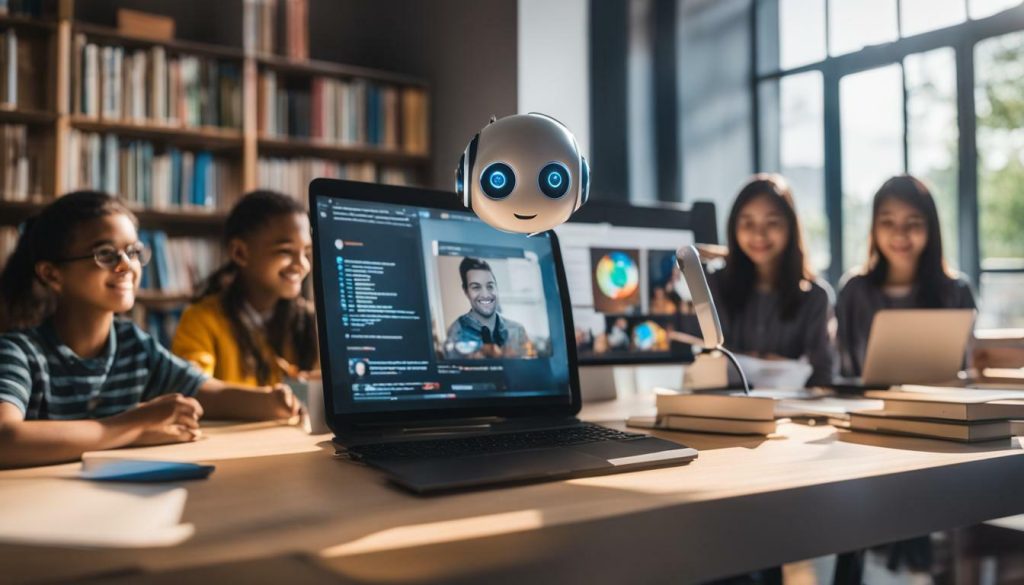
| Benefits of Chatbot Applications in Education |
|---|
| Automates administrative tasks |
| Provides access to learning resources |
| Assists in student assessments |
| Enhances student engagement |
| Offers personalized learning paths |
| Makes learning fun and interactive |
| Streamlines administrative tasks |
| Improves learning outcomes |
The Role of Chatbot Technology in Learning
Chatbot technology is revolutionizing learning in schools, with smart chatbots offering instant assistance and creating interactive learning environments. These AI-powered virtual assistants are transforming traditional education by providing students with 24/7 access to support and guidance.
With chatbots, students can receive personalized recommendations based on their learning history, ensuring that they receive tailored resources and materials to enhance their educational experience.
One of the key benefits of chatbot technology in learning is the ability to provide quick and accurate answers to questions. Students can engage in natural language conversations with chatbots, enabling them to ask questions and receive instant responses.
This not only improves their study skills and time management but also increases their motivation and engagement with learning. By having access to a wide range of resources at their fingertips, students can explore and deepen their understanding of various subjects.
Integrating chatbots into learning management systems allows for enhanced student engagement. Chatbots can make learning fun and interactive by creating gamified experiences and offering real-time feedback. They can also provide personalized learning paths for students, analyzing their data to recommend specific areas of focus and resources that align with their individual needs. Moreover, chatbots streamline administrative tasks in education, freeing up time for educators and administrators to focus on more meaningful activities.
| Benefits of Chatbot Technology in Learning: |
|---|
| 24/7 access to support and guidance |
| Personalized recommendations based on learning history |
| Quick and accurate answers to questions |
| Improved study skills and time management |
| Increased motivation and engagement with learning |
| Access to a wide range of resources |
Smart Chatbots for Schools
In the future, chatbots will play an even bigger role in education. They will serve as e-learning support, offering personalized assistance to students in their online learning journeys. Chatbots can also act as language teachers, helping students practice and improve their language skills in an interactive and immersive way.
Additionally, chatbots will provide valuable support to teachers, offering assistance in lesson planning, grading, and providing feedback. They will serve as personal tutors, offering individualized instruction and support to students based on their unique learning needs.
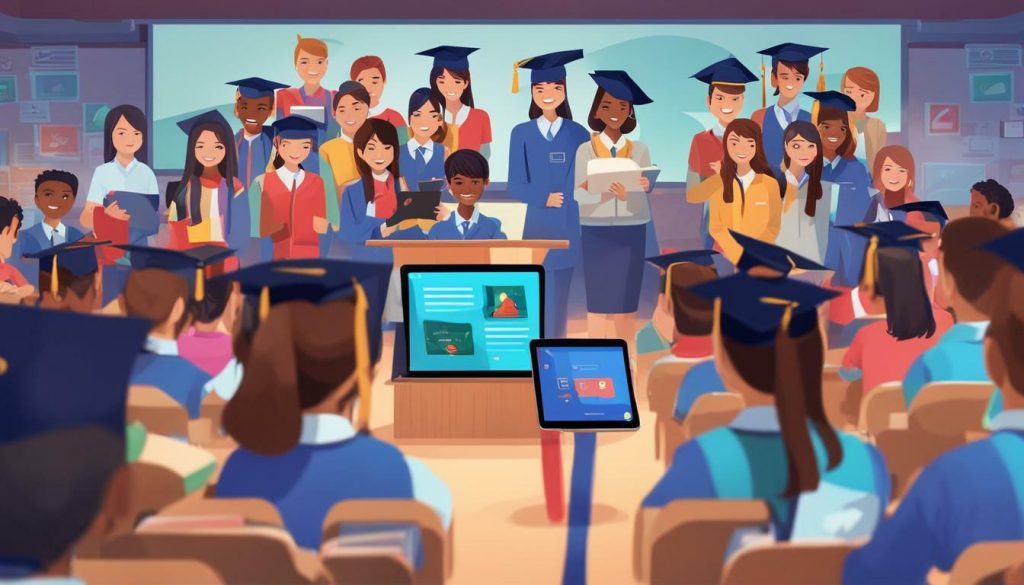
Chatbot technology is transforming education, creating new opportunities for personalized learning, enhanced student engagement, and improved learning outcomes. By leveraging the power of chatbots, schools can revolutionize the way students learn and interact with educational content.
The Future of Chatbots in Education
The future of chatbots in education is bright, with their potential to serve as e-learning support, language teachers, and enhance student life on campus. These AI-powered virtual assistants have already revolutionized the way students learn, providing 24/7 access to support and guidance. Through their ability to analyze a student’s learning history, chatbots can offer personalized recommendations and tailor their responses to meet individual needs.
One of the key benefits of chatbots in education is their ability to answer students’ questions quickly and accurately. This instant assistance helps students gain a deeper understanding of the subject matter and encourages active learning. Additionally, chatbots play a vital role in improving study skills and time management, as they can provide reminders for assignments, help students schedule their study time, and offer educational resources.
| Chatbot Applications in Education | Impact on Learning Outcomes |
|---|---|
| Automate administrative tasks | Improved study skills and time management |
| Provide learning resources | Increased motivation and engagement with learning |
| Assist in student assessments | Access to a wide range of resources |
“Chatbots play a vital role in improving study skills and time management.”
Moreover, chatbots have the ability to enhance student engagement through interactive learning experiences. They can gamify the learning process, providing students with a fun and immersive environment. Real-time feedback from chatbots allows students to track their progress and make necessary adjustments to their learning strategies.
These intelligent virtual assistants can also offer personalized learning paths, recommending specific resources or activities based on an individual student’s strengths and weaknesses.
| Personalized Learning Paths with Chatbots |
|---|
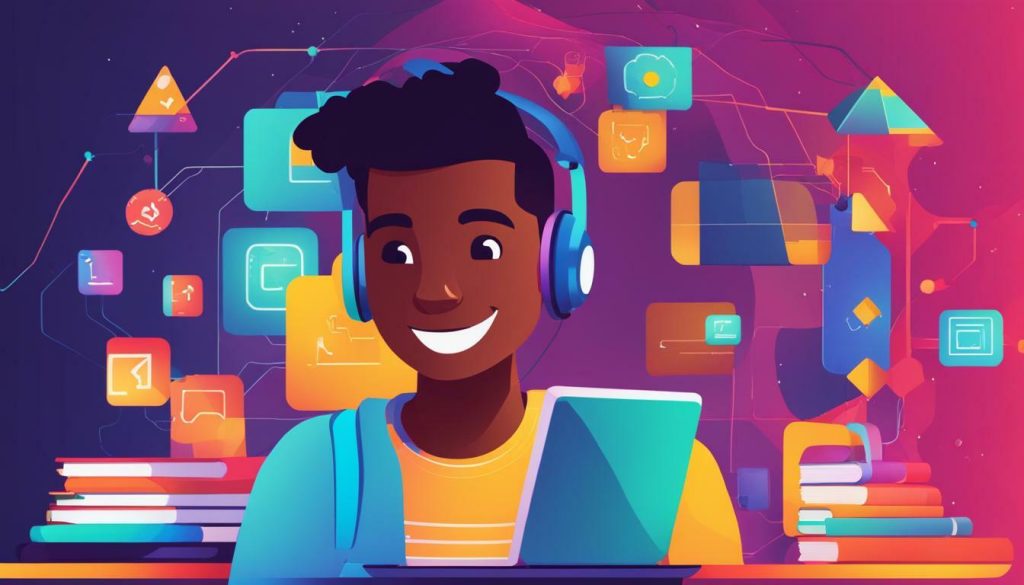 |
Enhancing Student Engagement with Chatbots
Chatbots play a vital role in enhancing student engagement, with smart chatbots in schools fostering interactive learning experiences, gamification, and real-time feedback. These AI-powered virtual assistants are revolutionizing education by providing students with 24/7 access to support and guidance, ensuring they have the resources they need to succeed.
Smart chatbots offer personalized learning paths, analyzing a student’s learning history to provide tailored recommendations and resources. With their ability to understand natural language and provide quick and accurate answers to questions, chatbots enable students to receive instant assistance, promoting a seamless learning experience.
Incorporating gamification elements, chatbots make learning fun and interactive. By gamifying the learning process, students are motivated to actively participate and engage with the material. Real-time feedback from chatbots also allows students to track their progress and identify areas for improvement, encouraging self-directed learning.

With the ability to streamline administrative tasks, smart chatbots in schools free up time for educators and administrators, allowing them to focus on delivering quality education. By automating processes such as enrollment, scheduling, and communication, chatbots simplify administrative workflows and improve efficiency.
The impact of chatbots on student engagement cannot be overstated. Through their personalized support, interactive learning experiences, and seamless administrative processes, chatbots empower students to take control of their education, fostering a positive and engaging learning environment.
Streamlining Administrative Tasks with Chatbots
Chatbots streamline administrative tasks in education, with smart chatbots automating processes such as enrollment, scheduling, and communication for educators and administrators. By leveraging chatbot technology, schools can simplify and expedite these tasks, freeing up time and resources for more important aspects of education.
One of the key benefits of using chatbots for administrative tasks is their ability to provide 24/7 access to information and support. Students and parents can easily access important information, such as enrollment deadlines or course schedules, without having to wait for office hours.
Chatbots can also automate communication processes, sending reminders and notifications to students and parents, and even answering frequently asked questions in real-time.
Additionally, chatbots can be integrated with learning management systems to provide personalized recommendations and support based on a student’s learning history. By analyzing data such as previous test scores and learning preferences, chatbots can recommend relevant study materials, suggest additional resources, and even create personalized learning paths for individual students.
| User | Process | Task |
|---|---|---|
| Student | Enrollment | Chatbot guides the student through the enrollment process, providing step-by-step instructions and answering any questions. |
| Teacher | Scheduling | Chatbot helps teachers schedule classes, set up meetings, and manage their calendars effortlessly. |
| Administrator | Communication | Chatbot sends automated notifications to students and parents about important dates, events, and announcements. |
Overall, chatbots play a vital role in streamlining administrative tasks in education, offering efficiency, accessibility, and personalized support. By automating processes, providing instant assistance, and offering personalized recommendations, chatbots contribute to a more efficient and engaging learning environment for both students and educators.
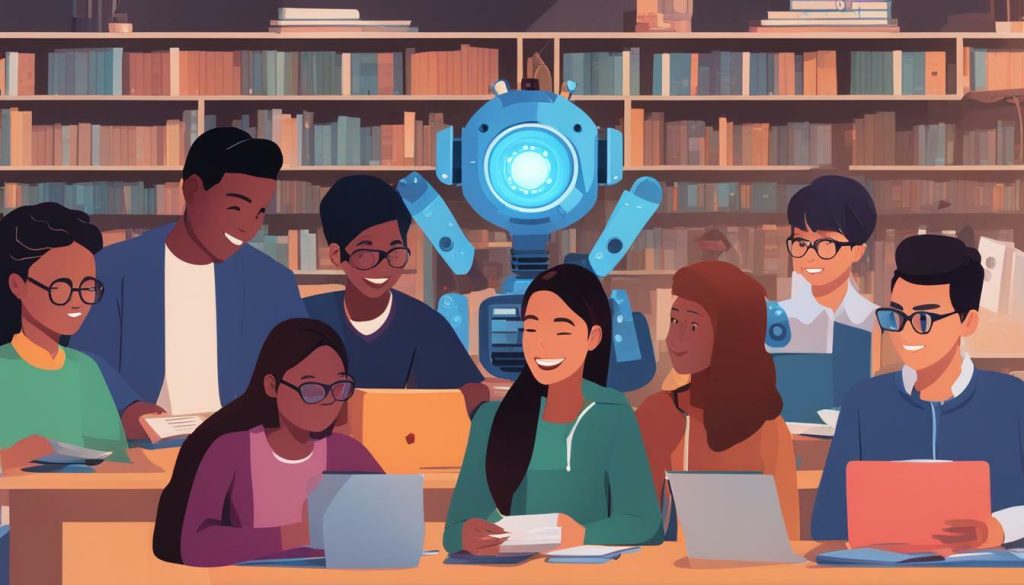
The Impact of Chatbots on Learning Outcomes
Chatbots significantly impact learning outcomes, improving study skills, time management, motivation, engagement, and access to resources. These AI-powered virtual assistants provide 24/7 support and guidance to students, ensuring they have the assistance they need whenever needed.
Chatbots help students stay organized, prioritize tasks, and manage their time effectively by offering personalized recommendations based on a student’s learning history.
Furthermore, chatbots foster increased motivation and engagement with learning by creating interactive and immersive experiences. They can be integrated with learning management systems to offer personalized learning paths, adapting the curriculum to suit individual student needs and preferences. With chatbots, learning becomes more fun and engaging, incorporating gamification elements and providing real-time feedback to keep students motivated and excited about their educational journey.
One of the key advantages of chatbots in education is their ability to provide access to a wide range of resources. Whether it’s textbooks, articles, videos, or practice exercises, chatbots can instantly deliver relevant learning materials, ensuring that students have the information they need right at their fingertips.
By making learning resources easily accessible, chatbots empower students to explore and deepen their understanding of various subjects.
The Role of Chatbots in Personalized Support
Chatbots play a crucial role in providing personalized support to students. Through natural language processing, chatbots can understand students’ questions and provide quick and accurate answers. They can also analyze a student’s learning history and preferences to offer tailored recommendations, helping students discover new topics, skills, and resources that align with their individual interests and goals.
With chatbots, students can receive personalized support and guidance at any time, enhancing their learning experience and improving their overall academic performance.
| Benefits of Chatbots in Education | Examples |
|---|---|
| Improved study skills and time management | Chatbots can help students stay organized, prioritize tasks, and manage their time effectively. |
| Increased motivation and engagement with learning | Chatbots create interactive and immersive learning experiences, incorporating gamification elements and providing real-time feedback to keep students motivated. |
| Access to a wide range of resources | Chatbots can instantly deliver relevant learning materials, ensuring that students have access to textbooks, articles, videos, and practice exercises. |
“Chatbots have revolutionized education by offering personalized support, enhancing student engagement, and improving learning outcomes.”
– Education Expert
The transformative potential of chatbot technology in education is immense. As technology continues to advance, chatbots will play an even bigger role in shaping the future of learning. They can serve as e-learning support, language teachers, personal tutors, and teacher support.
Additionally, chatbots can improve student life on campus by assisting with administrative tasks, such as enrollment and scheduling. With their ability to provide personalized support, foster engagement, and offer access to resources, chatbots are revolutionizing the way we learn and shaping a more efficient and effective education system.

Chatbots excel at providing personalized support to students, offering tailored recommendations, quick and accurate answers through natural language processing, and adapting to individual learning needs. With their ability to analyze student data and understand user intent, chatbots can provide valuable insights and guidance to enhance the learning experience.
One of the key benefits of chatbots in education is their capacity to offer personalized recommendations. By analyzing a student’s learning history and preferences, chatbots can suggest relevant resources, learning materials, and even personalized study plans. This level of customization ensures that each student receives the support they need to excel in their educational journey.
Furthermore, chatbots are equipped with natural language processing capabilities, allowing them to understand and respond to complex questions in a quick and accurate manner. Students can ask questions in their own words, and the chatbot can provide clear and concise answers, eliminating the need for extensive searching or relying on human assistance.
Example:
“I was struggling with understanding the concept of calculus, but the chatbot recommended interactive video tutorials and practice exercises to strengthen my understanding. It was like having a personal tutor available 24/7!” – John, a college student
Lastly, chatbots adapt to individual learning needs by continuously learning from user interactions. As students engage with the chatbot, it gathers valuable data and insights, allowing it to refine its responses and recommendations over time. This adaptability ensures that the chatbot’s support remains relevant and effective throughout the learning process.
| Benefits of Chatbots in Personalized Support |
|---|
| Offers tailored recommendations based on student’s learning history |
| Provides quick and accurate answers through natural language processing |
| Adapts to individual learning needs and preferences |
| Enhances personalized learning experiences |
As the field of education continues to evolve, chatbots play a crucial role in delivering personalized support to students. By offering personalized recommendations, quick and accurate answers, and adapting to individual needs, chatbots transform the learning experience, making it more engaging, efficient, and effective.

Education chatbots have the power to revolutionize learning and enhance student engagement, paving the way for a new era of personalized education. These AI-powered virtual assistants offer 24/7 access to support and guidance, providing students with personalized recommendations based on their learning history. They are capable of providing quick and accurate answers to questions, improving study skills and time management, and increasing motivation and engagement with learning.
In the future, chatbots will play an even bigger role in education. They have the potential to serve as e-learning support, language teachers, and personal tutors.
They can also provide teacher support and help improve student life on campus. With their ability to offer personalized assistance and create tailored learning experiences, chatbots are transforming education and shaping the way students learn.
Unlock the future of well-being and innovation! Dive into our blog for captivating discussions at the intersection of health and technology. Your journey to a smarter, healthier life begins now.
FAQ
What are the benefits of chatbots in education?
Chatbots in education offer 24/7 access to support and guidance, personalized recommendations based on a student’s learning history, quick and accurate answers to questions, improved study skills and time management, increased motivation and engagement with learning, and access to a wide range of resources.
How do chatbots improve learning outcomes?
Studies have shown that chatbots can improve learning outcomes by providing personalized support to students. They offer tailored recommendations, quick answers to questions, and adaptive learning paths based on individual needs, leading to enhanced learning and academic success.
How can chatbots be integrated with learning management systems?
Chatbots can be integrated with learning management systems to enhance student engagement. They provide immediate assistance, offer personalized learning paths, make learning fun and interactive, and streamline administrative tasks such as scheduling, communication, and assessments.
What role will chatbots play in the future of education?
In the future, chatbots will play a bigger role in education. They will serve as e-learning support, language teachers, teacher support, personal tutors, and improve student life on campus through their ability to provide personalized assistance and create engaging learning experiences.






